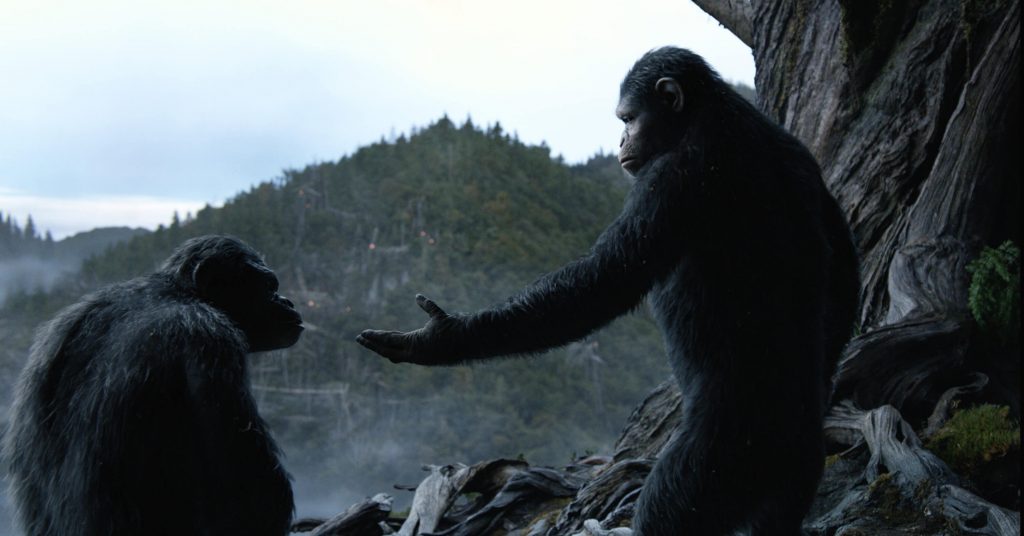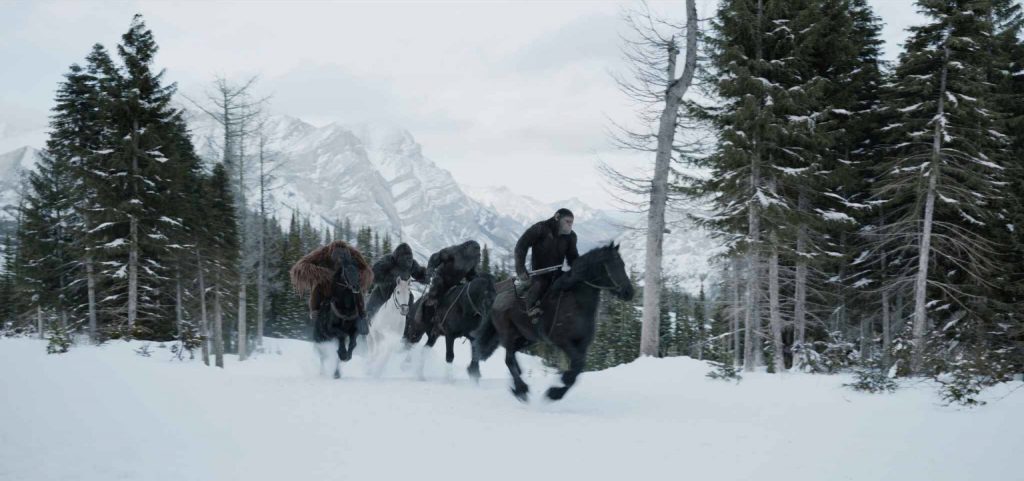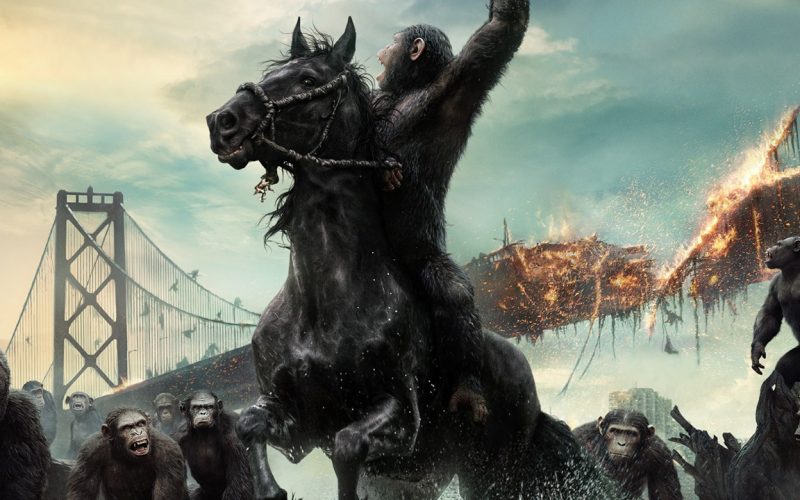From Rise to War: The Planet of the Apes (2011 – 2017).
When measuring the strength of a franchise, the Planet of the Apes is rarely an example listed at the top of such a conversation. But despite it being eclipsed by the obvious examples of Star Wars, James Bond, and the like, this ambitious sci-fi franchise has endured far longer than anyone would have expected since its humble beginnings in the late 1960s.
The original Planet of the Apes has its advocates, but for the most part it falls in the shadow of Star Wars (1977) and 2001: A Space Odyssey (1968). Spawning four sequels, each with diminishing budgets, it can be looked upon in hindsight as a minor phenomenon. To this day it whets the appetites of those looking for something meaningful in their science fiction. For all its comedic elements and horse-riding ape-action, the franchise is overflowing with satire and dark analogies of the world we live in. The themes that the early films explored are perched on a societal set of scales. The scope was great, at times apocalyptic, and while there are clear weaknesses the further into the series we get, each film has its own angle. It projects these angles onto its ensemble each time.
This is where things start to differ if we turn our attention to the modern, CGI-driven re-imagining of the apes mythology. The perspective in Rise of the Planet of the Apes, and a perspective that remains through its two sequels, is much narrower. The story has typically been told through two sets of eyes; in Rise, we have Caesar (played by Andy Serkis), who we meet as a baby and watch through his early years, and we have Will Rodman (James Franco), the man who raises him. With Rise it couldn’t have been made clearer that a modern interpretation would not fall into remake territory. In hindsight, it’s a commendable and bold choice.
Rise is very much a prelude, an origin story that could easily have failed to garner interest. It never really launches into action until the third act and, even then it’s a minor victory. It’s really the inciting event for Caesar’s story, told at the end of the first film. This is the first evidence to my belief that this trilogy, concluded with the recently release War for the Planet of the Apes, is the most thoughtfully constructed and rewarding trilogy of the past decade.

In Dawn of the Planet of the Apes, the brilliant middle chapter and the film with which director Matt Reeves took the reins, many years pass and we meet Caesar again with a family and a small colony of Apes living in the forest. Rise director Rupert Wyatt dropped out of the project despite his apparent enthusiasm, doubting his ability to get the job done for its 2014 scheduled release date. The film wastes no time getting its audience up to speed. A short montage at the beginning tells us all we need to know. At the foot of the forest is a small community of humans in desperate need of electricity. Jason Clark plays the second film’s human protagonist, and he plays a marginally smaller part in Caesar’s story than Will did. In Rise, Caesar’s distrust of humans is born. But in Dawn, his beliefs begin to blur when he meets humans equally as capable of good, and Apes equally as capable of terrible things. Caesar teaches his community key attributes, namely “Apes together, strong,” and “Ape never kill Ape.” Of course, these are tragically inserted into the film’s latter half and the conflict within Caesar’s heart leads to grim results.
War picks up two years after the events of Dawn, and without delving too deeply into spoilers, it takes on a Vietnam War-esque identity and we see Caesar’s people under assault from a human army led by the colonel (Woody Harrelson). There are many references to Apocalypse Now, a clear inspiration. Its villain seems plucked from a similar tree to the mythic Colonel Kurtz from Francis Ford Coppola’s film. The first frame of War is the backs of soldiers, their helmets brandishing slogans such as “monkey killer,” marching through the greenery.
With War the trilogy comes full circle in so many respects. For one, if the villain can be considered the human perspective in the film, a film which devotes nearly its entirety to Caesar’s point of view, then it’s interesting to note how skewed Caesar’s feelings toward humans become. Each film features humans less prominently than the last so that in the third film there is no human companion for Caesar and the audience to attach to. And yet there is still a place for them in Caesar’s heart. War introduces us to a young, mute girl named Nova (Amiah Miller), in what is perhaps the most fascinating and brilliant re-interpreting of the original films so far.
Where Caesar was raised by a human in Rise, aided by one in Dawn, he now becomes the reluctant caretaker of a child too helpless to survive in the harsh world of War. Caesar’s friend and adviser, Maurice the orangutan (Karin Konoval), petitions for the child’s safe passage with them on their journey. Maurice has been one of the great joys of the trilogy and the continued devotion to the character’s subplots has been wonderful. Maurice is one of few constants in Caesar’s ever-changing world. The journey itself is instigated by a haunting attack on Caesar’s family, which shifts War from a war film into something of a western (for a time). Framed by explosive opening and closing sequences, War for the Planet of the Apes is far slower than promotional material would have you believe and that’s entirely for the better. This is a trilogy that stands out from its summer blockbuster counterparts in that it is so richly written and carefully told. Key conflicts in all three films could easily have been given fiery backdrops and could not be blamed for it, but while they certainly have their share of action-oriented turbulence, there’s complete devotion to character in each part of Caesar’s story.

There’s plenty of biblical imagery running right through the films, most notably in Dawn and War. In Dawn it’s the death and resurrection of Caesar, when he’s shot down by one of his own and is missing in action for a large portion of the film. In War, it’s so many things. It’s the four horsemen of the apocalypse, it’s the many crosses seen throughout (and later Caesar being literally tied to one himself), and it’s the avalanche that takes the place of the great flood. These are not essential points to note and it won’t hinder anyone’s enjoyment if these things aren’t clear. Caesar’s arc is not entirely original. It recalls many similar tales of oppression and rebellion, but it’s the imagination given to the themes and to the characters, a creative jolt in the scripts of each film that give them their sparkle. These are the things that help keep Planet of the Apes relevant.
The quieter moments come at such integral points. Dawn has its most memorable sequence during Caesar’s recovery in the house that he was raised. He reflects on the man who raised him in Rise, and he muses on humanity’s ability to be good and kind. The character grows wearier with each film. In War, the moment comes shortly after its inciting tragedy, in a tiny settlement in which they kill a man and find Nova. At this point, Caesar has lost nearly all of his love left for humans. He is disinterested in helping the child, at least at first. Later on he tells his companion that, despite his being aware of it, he cannot resist the hate and thirst for vengeance that plagued Koba, the rogue Ape of Dawn. Caesar betrays his people for the sake of a vendetta making for the driving, internal conflict that War creates.

War for the Planet of the Apes concludes one of the great modern trilogies quite completely and succinctly. You’ll find no teaser of what’s to come nor do writers Matt Reeves and Mark Bomback (who wrote a late draft of Dawn) leave anything open-ended. As Reeves has said in interviews, there are more stories to tell. However, War is conclusively the end to this one. It’s the kind of complete vision that the original franchise, for all its highlights, lacked. My fondness for the original films does not cloud the fact that it plays out entirely as a franchise made up as it went along. These three most recent films share most in common with the latter two films of the originals (I’m confident of two things following War; that we’ve had our first glimpse at the infamous mutants and that we won’t be seeing time-travel creep into any potential sequels), paving the way for a time jump and the potential to see some beloved characters from the first three movies enter a contemporary setting.
Rise, Dawn, and War contain similar themes to the films they are rebooted from, however, their moral tugs-of-war are less overt and far more personal. Smaller in concept, epic in scale, and deeply intimate, War For The Planet Of The Apes concludes one of the finer trilogies we’ve seen this century.

